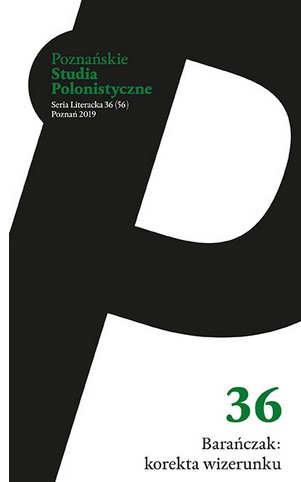W. T. W. Pisarz-idol. Witold Wirpsza w lekturze Stanisława Barańczaka
W.T. W. Writer-idol. Witold Wirpsza in Stanisław Barańczak’s works
Author(s): Dariusz PawelecSubject(s): Poetry, Comparative Study of Literature, Polish Literature, Theory of Literature
Published by: Wydawnictwo Poznańskie Studia Polonistyczne
Keywords: Stanisław Barańczak; Witold Wirpsza; literary criticism; language poetry; myth; irony; political writing;
Summary/Abstract: The outline discusses Stanisław Barańczak’s fascination with Witold Wirpsza’s works. Its clearest symptom was his infection with Wirpsza’s ‘stylistic tissue’, which is something Barańczak himself admitted. This infection is clearly visible in the first three collections: Facial Corrections (Korekta twarzy), Without Stopping for Breath (Jednym tchem) and Morning Journal (Dziennik poranny). The key sources of references and inspirations for these collections were Wirpsza’s poems from the collection Superstitions (Przesądy) and the digressional poem Faeton. The article demonstrates how Stanisław Barańczak presents the readers with a specific ‘key to Wirpsza’ in his works of literary criticism. According to the author of The Diffident and the Proud (Nieufni i zadufani), literary criticism was unable to cope with Wirpsza. What pushed the young poet from Poznan to remodel the reading of Wirpsza’s poetry and to make significant changes to contemporary poetic tendencies was the collection Superstitions (Przesądy) published by Wirpsza in 1966, one year after his essay collection Game of Meaning (Gra znaczeń). Barańczak assigned Wirpsza to the language poetry movement. In his later accounts of reading, Barańczak the critic suggested that there was a ‘deep gap’ between Wirpsza’s achievements from various periods of his work.
Journal: Poznańskie Studia Polonistyczne. Seria Literacka
- Issue Year: 2019
- Issue No: 36
- Page Range: 41-58
- Page Count: 18
- Language: Polish

